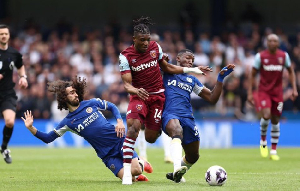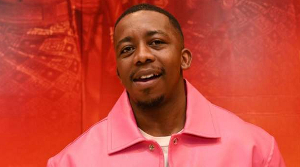- Home - News
- TWI News | TV
- Polls
- Year In Review
- News Archive
- Crime & Punishment
- Politics
- Regional
- Editorial
- Health
- Ghanaians Abroad
- Tabloid
- Africa
- Religion
- Election 2020
- Coronavirus
- News Videos | TV
- Photo Archives
- News Headlines
- Press Release
General News of Monday, 9 October 2006
Source: Public Agenda
Ghana faced with rising numbers of street kids
Children have been migrating from the rural areas to the cities for decades, but since the early 1990s, their numbers have been growing rapidly, and experts worry that Ghana’s population of street children will explode in the coming years.
According to UNICEF, the United Nations Children’s Fund, there are currently 30,000 children living on the streets of Ghana’s cities and towns. In Accra alone, there are 20,000, according to estimates by CAS, Catholic Action for Street Children, the largest NGO dealing with street children in the country. Most street children in Ghana are between the ages of 10 and 18, though there are many who are far younger. Most have been on the streets for several months or years. They leave their villages in search of money to marry or go back to school, to escape the hopelessness and poverty of many rural areas, or to build a better future for themselves.
In the City of Accra many street children find their home on the streets. While several have come from the rural areas of Ghana and surrounding countries, others have been born in the streets. The ratio of boys: girls is 50% each. These street children are all below the age of 18 years and are not supported by anyone. The actual number is not known and it is also not important to know because every child who lives in the street should not be there.
In addition to the Street Children, many urban poor children can be found in the streets. These are children who find themselves in an urban area and have some kind of supportive home to go to, but they are on the street because of the lack of the basic necessities of life.
It is in line with this that the Director for Catholic Action for Street Children Mr. Jos Van Dinthir, has called on the government to fight the problem of street children by putting in place strategic plans and actions to help address the problem.
He appealed to government to formulate policies that seek the development and welfare of children especially street children. “The problem of street children has come to stay; government should recognize the real problem, study the problem and be serious in providing lasting solutions to the problem.”
Speaking in an interview with the Public Agenda, he observed that every child has the right to sport and play no matter where the child lives. He said these activities make learning interesting and less stressful.
He disclosed that the Catholic Action for Children (CAC) has chosen to work mainly for the street children but it also supports street mothers who have their children in the streets.
In furtherance of this, CAC has provided a training center, where these street children are trained in employable skills. He said on the average between 20 and 40 children attend classes daily, different subjects, with varying levels of difficulty are taught, from reading and writing to mathematics, English and social skills. Children also learn drama and music at Hopeland Training Centre. “Teaching at CAS is done by staffs that are not trained as teachers. The most important approach is first to have a good relationship with the child and teach them the basic necessities of life”, he said. The Chief Executive Officer of Right to Play, Johann Olav Koss said it is very important to ensure that street children, like other children are provided with the right environment to learn and play because it the right of every child to get education.
“Every child should have the same opportunity emotionally, physiologically and mentally in order to develop well”, he told journalists on his visit to Accra. He said sports gives a healthy life style especially to growing children and also enables them set effective goals and work hard to achieve them. “When I see children playing, happy and laughing, I get so fulfilled and get encouragement to work harder to make the world a better place for children”. He said plans are under way to extend the Right To Play programmes to the north and other regions.
He further disclosed that children with disabilities have not been left out of the programmes, adding that specialized modules have been designed to enable such children take part in all Right To Play programmes.
Mr. Koss also said the Right To Play will be collaborating with the Ministry for Education, Sports and Science and also with the Football Association to be able to reach more children.
Mr. Johann Olav Koss is one of the greatest winter athletes of all time. The four times Olympic Gold Medalist in speed skating made world headlines when he won three Gold Medals at the 1994 Lillehammer Games in the 1,500, 5,000 and 10, 000 meter events.
Right to Play is a registered international NGO in Ghana and has been implementing the Sport Health program since November 2001. The program started with Right to Play’s participation in the 5 in 1 immunization festival. Right to Play Ghana collaborates with a number of government departments, international, national and local organisations to promote the use of sport as a tool for development thus creating positive change within the community.










